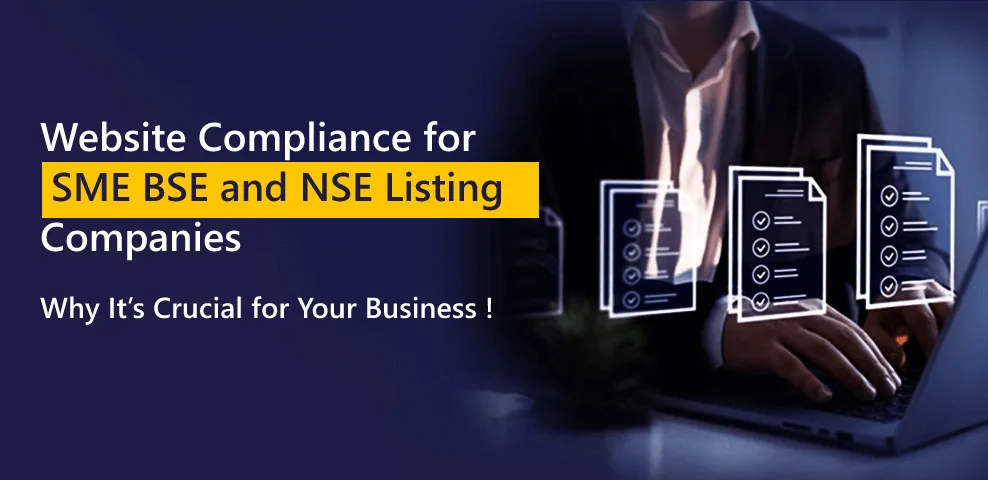In today’s digital-first world, your website plays a critical role in showcasing your business to investors, clients, stakeholders, and regulators, especially if you are an SME planning or already listed on BSE or NSE. Being listed on these prestigious platforms not only enhances your company’s credibility but also brings additional compliance requirements—especially regarding your company’s online presence.
A well-maintained website that complies with all regulatory norms can make a positive impression on potential investors and serve as a powerful tool for brand building. However, failure to adhere to these compliance norms can lead to penalties or even suspension from the stock exchanges. Here, we explore the key website compliance requirements for SMEs listed on the BSE or NSE, and why keeping your website compliant should be a top priority.

The Importance of Website Compliance for Listed Companies
The BSE (Bombay Stock Exchange) and NSE (National Stock Exchange), two of India’s largest stock exchanges, have stringent regulations for listed companies, including SMEs (Small and Medium Enterprises). Part of these regulations include maintaining an updated, informative, and compliant website.
Being listed on these platforms brings a lot of visibility, but it also means your company is under increased scrutiny from investors, regulators, and the public. Website compliance ensures that all stakeholders have access to transparent, accurate, and updated information about your company’s financial performance, governance, and operations.
For SMEs in particular, this is crucial because compliance with these regulations can make the difference between gaining trust from investors or facing penalties for non-compliance.
Key Website Compliance Requirements for SME BSE and NSE Listing Companies
1. Mandatory Information Disclosure
The Securities and Exchange Board of India (SEBI) requires all listed companies, including SMEs, to disclose certain critical information on their websites. This includes:
- Financial results: Quarterly, half-yearly, and annual results must be published.
- Company policies: Disclosure of company policies on corporate governance, whistleblower policy, and risk management.
- Annual reports: Full, downloadable versions of annual reports.
- Investor relations: A dedicated section for investors, with all required documents, stock performance, and updates.
- Board of Directors: Detailed profiles of board members, including roles and responsibilities.
Non-compliance with these disclosures can result in penalties from the exchanges and even suspension from trading.
Is Your Website Up to Compliance? Are you aware of the mandatory disclosures required by SEBI for your SME listed on BSE or NSE?
2. Accessibility and Usability Compliance
Failing to make your website accessible can not only lead to non-compliance but also cause loss of investor trust. It’s important that your site is easy to navigate and provides critical information in a transparent manner.
3. Timely Updates and Maintenance
Website compliance isn’t a one-time task. Regulatory bodies like SEBI, BSE, and NSE require that your website be updated regularly with the latest financial disclosures, board changes, and policy updates.
For SMEs, maintaining a website that complies with stock exchange guidelines is essential for keeping investor confidence high. Failing to update your site with the latest information can lead to loss of credibility, which can hurt your stock performance and investor relations.
Neglecting Website Maintenance? Has your website not been updated in months? Is your SME struggling to keep up with BSE and NSE compliance for your online presence?
4. Security and Data Protection Compliance
Given the rise of cybersecurity threats, especially for companies listed on stock exchanges, website security is paramount. Your website should be equipped with SSL certificates, firewalls, and regular security updates to protect sensitive company and investor information. Stock exchanges may penalize companies for security breaches or for not maintaining data privacy protocols.
- Secure login systems for investors accessing sensitive data.
- Encryption for data transmission to prevent cyber attacks.
- Regular security audits to identify vulnerabilities.
Security breaches not only lead to non-compliance but can also severely damage your company’s reputation, leading to investor distrust.
5. Mobile-Friendly and SEO-Optimized Websites
To comply with BSE and NSE guidelines, your website needs to be mobile-friendly, ensuring that it is accessible across all devices. Mobile optimization is crucial as investors and stakeholders often use their smartphones to access important company data.
Additionally, your website should be SEO optimized, making it easier for investors, clients, and regulators to find key information quickly. SEO helps improve the visibility of critical disclosures, ensuring that your website meets both technical and regulatory compliance.
The Impact of Non-Compliance
Failing to comply with website regulations for SMEs listed on BSE and NSE can lead to serious consequences:
- Penalties from stock exchanges for failure to update required information.
- Suspension of trading, leading to a loss of investor trust and capital.
- Damage to your reputation, affecting potential business collaborations and stakeholder relationships.
Advantages of Keeping Your Website Compliant:
- Increased Investor Trust: A well-maintained, compliant website gives investors confidence in your business. This is critical for attracting new investors and retaining existing ones.
- Regulatory Peace of Mind: Stay compliant with SEBI, BSE, and NSE guidelines, reducing the risk of fines or penalties.
- Better SEO and Visibility: A regularly updated and compliant website is more likely to rank higher on search engines, making it easier for investors and stakeholders to find your company.
- Enhanced User Experience: Accessibility and usability compliance ensure that all stakeholders can easily navigate your site and find the information they need.
- Stronger Security: Implementing regular security updates and data protection measures protects both your company and investor data, reducing the risk of cyber threats.
Disadvantages of Non-Compliance:
- Penalties from Stock Exchanges: Missing critical updates or disclosures can lead to significant penalties or trading suspensions.
- Loss of Investor Confidence: A neglected or outdated website can lead to decreased trust from investors and stakeholders.
- Security Breaches: Without regular maintenance and security updates, your website is vulnerable to cyberattacks.
- SEO Ranking Decline: Failing to update your website reduces its relevance, causing it to fall in search engine rankings and becoming harder to find.
- Poor User Experience: A website that is difficult to navigate, out-of-date, or not mobile-friendly frustrates users and diminishes the overall reputation of your business.
Ensure Your Website is BSE and NSE Compliant Or contact us at +918888866110 to schedule your free website compliance audit.
Conclusion:
For SMEs listed on BSE and NSE, maintaining a compliant website is not just a regulatory necessity, but also a powerful tool for building investor confidence, protecting your brand, and ensuring long-term growth. As part of your ongoing business operations, regularly updating your website ensures that you stay in compliance with SEBI guidelines, protect against cyber threats, and offer a seamless user experience for all stakeholders.
At I Knowledge Factory Pvt Ltd, we specialize in Website AMC Services in Pune for SMEs, ensuring that your website remains compliant with all regulatory requirements and is maintained to the highest standards.

Ashish Dalia is the CEO & Chief Digital Marketing Strategist at I Knowledge Factory Pvt. Ltd.


Ashish Dalia is the CEO & Chief Digital Marketing Strategist at I Knowledge Factory Pvt. Ltd.




